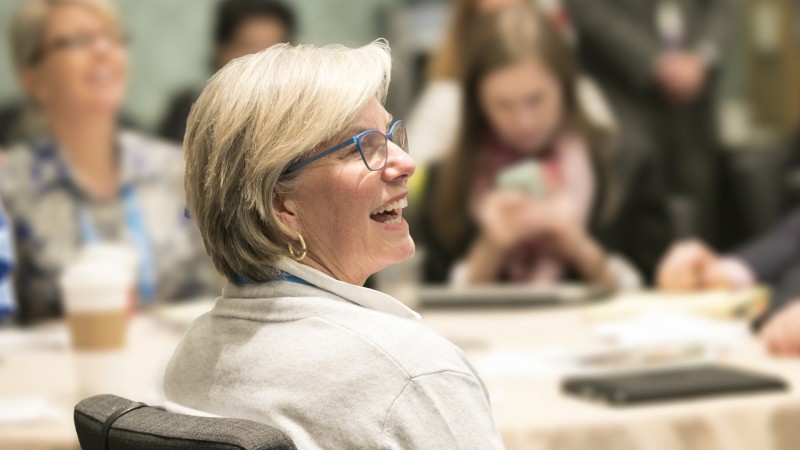
5 (Hard-Earned) Lessons From a 15-Year Grant Professional
I've been working in grant writing for a long time, and I've learned many valuable lessons along the way. Here are my top five.
#1: Not all money is good money. Early in my career, I was hungry for the win. I would apply for any and every grant—the proverbial square peg in a round hole. I would bring my boss some, in hindsight, ridiculous opportunities that we could certainly win, but would also be a forced fit. She would repeat to me over and over that “not all money is good money.” This has stuck with me more than anything I’ve ever learned.
Admittedly, there are still some occasions where a grant win comes in, and in hindsight we regret ever going after it, but the more we learn from these experiences, the better we are at spotting the forced fit.
#2: Measure impact first; it’s not just the number of commas. It took me a few years to shift my mindset from a laser focus on raising dollars to understanding the importance of measuring the work of a grant professional by impact. Some of the smallest awards—the ones we almost passed on because of the award amount—have had the largest impact. A year or two down the line, they’ve opened other doors, started amazing initiatives, developed into larger opportunities, or helped developed an invaluable partnership. Conveying the balance between the amount of an award and the potential impact is often one the most important roles we play as grant professionals.
#3: There is right, wrong, and different. Someone told me recently: There is only one way to build a piano; it must be perfect. We are developing grants, not building pianos. Sure, we must put our best foot forward, but there is a time when we must bless and release our work into the universe and accept that done is better than perfect. This is a mental challenge, especially as a leader (and a perfectionist), because when it comes to grant writing styles, sentence structure, use of visuals, etc., it’s important to remember that there is right, wrong, and different. And sometimes, my way isn’t right, it’s just different than the way someone else does something. There is a lot of learning that can happen in this space that makes us all better at our jobs.
#4: It’s not over until it’s over. To this day, the hardest professional "no" I’ve ever received was when I was the lead writer on a multi-million-dollar, multi-college grant and learned that we were disqualified due to a (benign) form not being uploaded with our submission. I was devastated, to say the least. After several weeks, I uncurled from the fetal position and began connecting with my network of fellow grant professionals. I received an abundance of encouragement, several "been there done that" stories, and solid advice on how to push back with the funder. Unfortunately, too much time had passed and what was done was done.
Fast forward three years to a different grant, same situation, but this time we pushed back, made our justification, and lo and behold, the funder reversed their decision and we were funded.
#5: Your network is your lifeline. A lot of what I’ve learned came from trial and error, but more than anything I’ve learned from my fellow grant colleagues. We’ve all joked about how no one goes to school to be a grant writer, so this leads us to one of our greatest professional challenges: How do we learn? Grow? Evolve? And this is where I insert a shameless plug for the CASE Conference for Community College Grant Professionals, because the network I’ve developed through attending conferences focused on our unique profession has been the number one most valuable lifeline I have (see lesson #4). As professionals, we must connect, build relationships, ask questions, share ideas and resources, and pay it forward. The relationships that I have created over the years have developed into an invaluable network of individuals to connect with when things go wrong, when a deadline is looming and I can’t get a funder to respond, or when I need someone to bounce ideas off of.
Sure, we often are vying for the same grants, but at the end of the day, helping each other makes us better not less competitive.
Learn more at the Conference for Community College Grant Professionals
About the author(s)
As a member of the Institutional Advancement leadership team at St. Petersburg College (SPC), Katie Shultz serves as the executive director of grants development. Shultz has spent the past 17 years working as a development professional, including positions in fund distribution for the United Way, individual donor development, and grant writing for several nonprofit organizations. She joined the SPC Grant Development team in 2012.
During her time at SPC, Shultz has led several successful grant writing teams which have resulted in significant support for the college from various funding sources, which included the Department of Education, the Department of Labor, National Science Foundation, Florida College System and the Bill and Melinda Gates Foundation.
In her role at SPC, Shultz’s responsibilities focus on the oversight of pre-and post-award grant activities, continued identification and development of funding opportunities, the cultivation of internal and external partnerships, and the coordination of strategies to promote the college’s mission.
Shultz has completed her doctorate in leadership education (Ed.D.) at the University of New England and holds a master’s degree in nonprofit management from Rutgers University along with a bachelor’s degree in social work from Eastern University.








